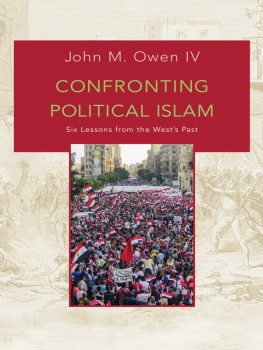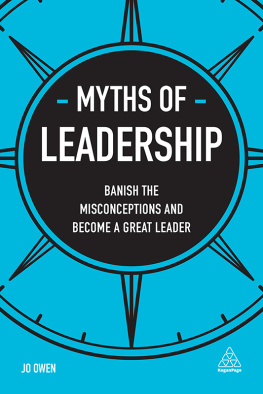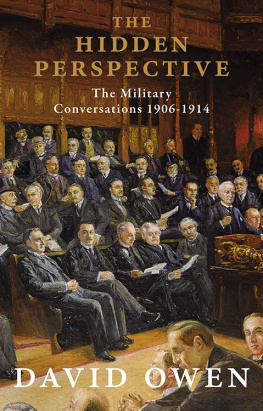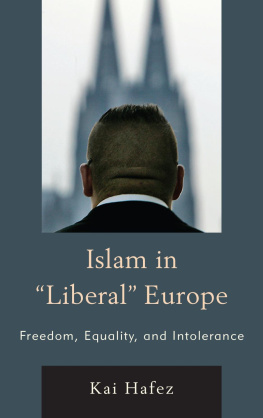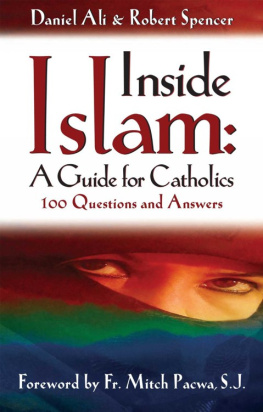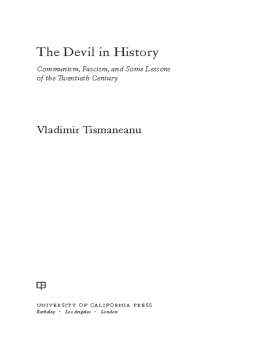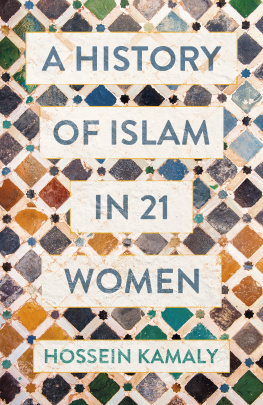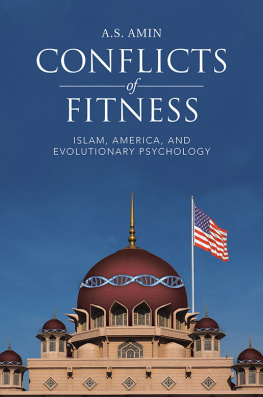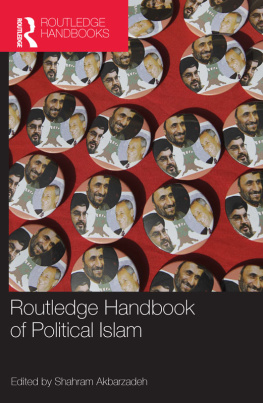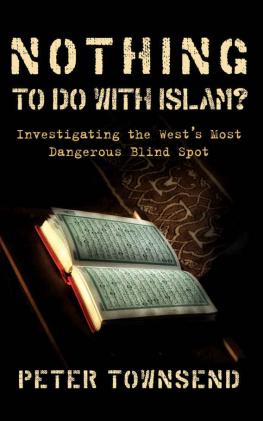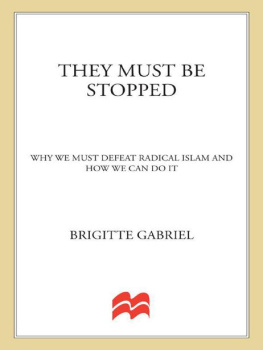
CONFRONTING POLITICAL ISLAM
CONFRONTING POLITICAL ISLAM
Six Lessons from the Wests Past
John M. Owen IV
PRINCETON UNIVERSITY PRESS
Princeton and Oxford
Copyright 2015 by Princeton University Press
Published by Princeton University Press, 41 William Street, Princeton, New Jersey 08540
In the United Kingdom: Princeton University Press, 6 Oxford Street, Woodstock, Oxfordshire OX20 1TW
press.princeton.edu
Jacket art: Sacking Police Station in Naples, Italy, during a riot. Worms after Cairoli, published in LIllustration, Journal Universel, Paris, 1860. Antonio Abrignani/Shutterstock. Photograph: Egyptians Protest against President Morsi in Sidi Gaber, Alexandria, Egypt, June 30, 2013. MidoSemsem/Shutterstock.
All Rights Reserved
ISBN 978-0-691-16314-7
Library of Congress Control Number: 2014947452
British Library Cataloging-in-Publication Data is available
This book has been composed in Minion Pro & ITC Avant Garde Gothic
Printed on acid-free paper
Printed in the United States of America
1 3 5 7 9 10 8 6 4 2
For Malloy, Frances, and Alice
CONTENTS
Introduction
It Did Happen Here 1
Lesson 1
Dont Sell Islamism Short 26
Lesson 2
Ideologies Are (Usually) Not Monolithic 46
Lesson 3
Foreign Interventions Are Normal 67
Lesson 4
A State May Be Rational and Ideological at the Same Time 86
Lesson 5
The Winner May Be None of the Above 110
Lesson 6
Watch Turkey and Iran 130
Conclusion
What to Do and What Not to Do 156
ILLUSTRATIONS
TABLES
PREFACE
Nearly a century after it first emerged in Egypt, political Islam confronts the world and the world confronts political Islam. Also called Islamism, this potent ideology holds that the billion-strong Muslim community would be free and great if only it were piousif Muslims lived under state-enforced Islamic law or Sharia, as Muslims have for most of Islamic history. Islamists have long been confronted by Muslims who reject Sharia, and by non-Muslims who press or influence them to reject it. These interlocking confrontations sometimes have been benign, in the sense of parties standing face to face, and sometimes malign, in the sense of parties standing against and even fighting each other. Whether benign or malign, the confrontations continue to matter because they shape not only the lives of Muslims but also the politics of many nations and indeed of the entire world.
Islamism began in the 1920s as a call to Muslims living in modernizing, secularizing societies to return to Sharia, derived from the Quran and various other sacred or authoritative texts of Islam. As they encountered resistance from both militaries and other elites, Islamists became increasingly political, desiring to influence or capture the states that were reshaping their societies so that those states would enforce Sharia. By the 1950s many Islamist movements had been radicalized and were being ruthlessly suppressed by the regimes they had come to hate.
Thanks to the scholarship of scores of experts on Islamic jurisprudence, theology, and history, we know a great deal about Islamism. But most of this scholarship treats this ideology as if it were sui generis, unique, to be studied only in isolation. Like any social phenomenon, political Islam does have singular features that may be understood only through deep study. Yet, Islamism is an ism, an ideology, a plan for ordering common life. As such, it can be compared profitably with other isms.
No part of the world has generated as many isms as the West itselfEurope and the Americas. Although scholars and journalists occasionally draw parallels between the Middle East today and the West in earlier centuriesjihadi terrorists to anarchists around 1900, or the Arab Spring to the European revolutions of 1848until now no one has attempted a sustained comparison between political Islam and Western ideologies of the past.
This book carries out such a comparison. It begins with the observation, already made by scholars of Islamism, that this complex and robust ideology cannot be understood without reference to the broad ideology to which it is a reaction: secularism. In its original form, secularism in the Muslim world mandated that the laws derive from strictly human reason and experience, and not from divine revelation. Secularism came to Muslim lands in the nineteenth century, at the hands of European colonizers, and in the twentieth, at the hands of authoritarian modernizers such as Mustafa Kemal of Turkey and Reza Pahlavi of Iran. Twentieth-century hard-edged secularism is all but dead in the Middle East todaymost Muslims accept that Islam should at least influence law and governmentbut Islamists still define themselves and struggle against various shades of softer secularism.
In coexisting with its opposite, Islamism is, again, like ideologies in the Wests own past. Confronting Political Islam builds upon my past scholarly work, especially my 2010 book The Clash of Ideas in World Politics, in focusing on ideological contests in Europe and the Americas that stretched across countries and decades, scrambling power relationships and altering expectations and behavior, generating new patterns of conflict and cooperation, befuddling both participants and observers, and finally ending in unexpected times and ways. From the Wests own past I sift six broad lessons for policy makers and citizens trying to deal with the prolonged ideological travails in the Middle East.
I am grateful to many people and institutions for helping me conceive of, research, and write this book. The Institute for Advanced Studies in Culture at the University of Virginia provided ideas and criticismfrom scholars including James Hunter, Ashley Berner, Josh Yates, Joe Davis, Neslihan evik, Chuck Mathewes, and George Thomasand its genteel intellectual hothouse, Watson Manor. John Moon and the IMR Foundation, Earhart Foundation, and the Smith Richardson Foundation all provided funding that enabled me to devote a scholars most precious commoditytimeto the book. For invaluable research assistance I thank Bob Kubinec and Malloy Owen. Conversations with Michael Barnett, Peter Katzenstein, Ahmed al-Rahim, Judd Owen, Alexander Evans, and my Politics Department colleagues at the University of Virginiaespecially Bill Quandt, Jonah Schulhofer-Wohl, and Jeff Legrowere most helpful. The Centre of International Relations at the University of British Columbia provided me with a place to write and research during the summers. For , I thank Chris Gist.
The Smith Richardson grant enabled me to hold three workshops in Washington, where I tested some of the arguments on academic, military, intelligence, and policy analysts. I thank the Brookings Institution and the Heritage Foundation for hosting those bracing sessions. I also thank those in attendance, especially Michael OHanlon, Steve Grand, Nathan Brown, Karim Sadjadpour, Peter Mandaville, Marc Lynch, Charles Cully Stimson, Reuel Marc Gerecht, Jim Philips, Lisa Curtis, Peter Henne, and Tim Shah. Special thanks go to Roger Herbert for handling logistics and for offering his own criticism of the manuscript itself.
While he was still a senior editor at Princeton University Press, Chuck Myers was both advocate and critic; without him, this book never would have been written. Eric Crahan at Princeton carried the project through with skill and care. The two manuscript reviewers, Jeremy Pressman and Dan Nexon, helped me see things that I had not and steered me away from some errors in fact and interpretation. Joseph Dahm was a superb copy editor.
Next page
